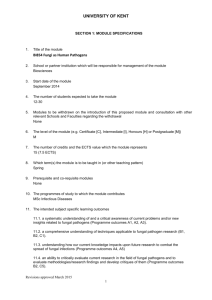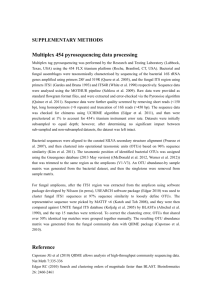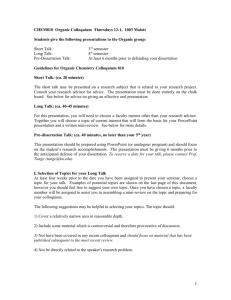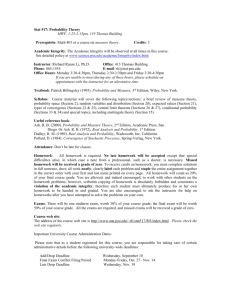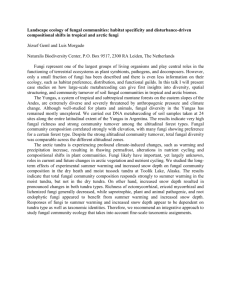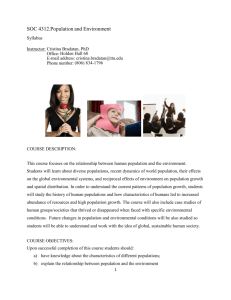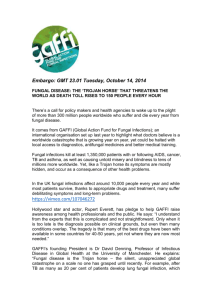and Grading policy - North Dakota State University
advertisement
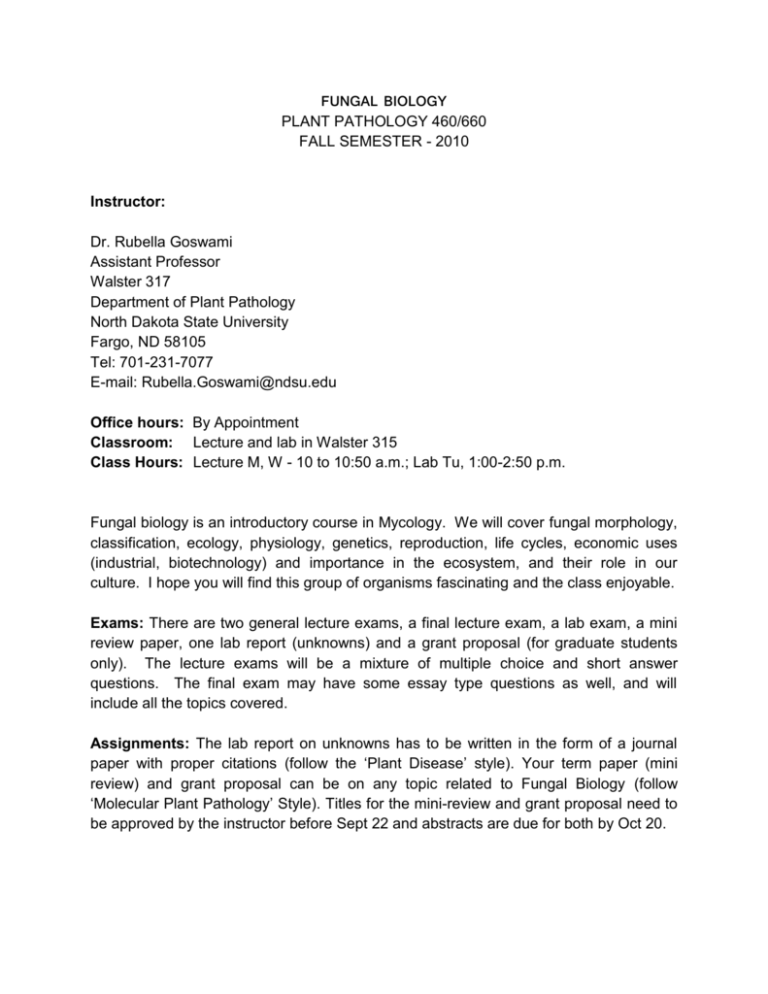
FUNGAL BIOLOGY PLANT PATHOLOGY 460/660 FALL SEMESTER - 2010 Instructor: Dr. Rubella Goswami Assistant Professor Walster 317 Department of Plant Pathology North Dakota State University Fargo, ND 58105 Tel: 701-231-7077 E-mail: Rubella.Goswami@ndsu.edu Office hours: By Appointment Classroom: Lecture and lab in Walster 315 Class Hours: Lecture M, W - 10 to 10:50 a.m.; Lab Tu, 1:00-2:50 p.m. Fungal biology is an introductory course in Mycology. We will cover fungal morphology, classification, ecology, physiology, genetics, reproduction, life cycles, economic uses (industrial, biotechnology) and importance in the ecosystem, and their role in our culture. I hope you will find this group of organisms fascinating and the class enjoyable. Exams: There are two general lecture exams, a final lecture exam, a lab exam, a mini review paper, one lab report (unknowns) and a grant proposal (for graduate students only). The lecture exams will be a mixture of multiple choice and short answer questions. The final exam may have some essay type questions as well, and will include all the topics covered. Assignments: The lab report on unknowns has to be written in the form of a journal paper with proper citations (follow the ‘Plant Disease’ style). Your term paper (mini review) and grant proposal can be on any topic related to Fungal Biology (follow ‘Molecular Plant Pathology’ Style). Titles for the mini-review and grant proposal need to be approved by the instructor before Sept 22 and abstracts are due for both by Oct 20. Guidelines for mini-review: 1. 2. 3. 4. 5. 6. 7. It must be well written and organized and typed double spaced with 1” margins. References should be cited as per the journal Plant Disease. References should be recent and have up-to-date information. The organization of the paper is your choice but use subtitles. A 250 word abstract should be included at the beginning of the paper. An example of the format will be provided to you. Papers by undergraduates must be a minimum of 8 pages of text followed by the references Papers by grad students must be a minimum of 11 pages of text followed by the references. Graduate students are also required to write and present a grant proposal on a topic of their choice. This has to be written according to the USDA-CSREES requirements (guidelines available at http://www.csrees.usda.gov/funding/rfas/pdfs/08_specialty_crop.pdf). If you choose to write on the organism you work with, be sure to choose an area that is different from your graduate project. Attendance: Lab and class attendance is mandatory. There are no prescribed texts but readings assigned from time to time and will be included in the exam. A maximum of two excused absences from class (1 lab and 1 lecture) may be allowed with prior permission from the instructor. Points will be awarded for each lecture or lab attended. Marks and grading: Two lecture exams (100 pts each) Final lecture exam Lab exam Lab report on unknown fungi (undergrads receive 1 unknown; grads receive 2 unknowns) Mini review Grant proposal (Grad students only) (presentation 50 points, writing 100 points) Attendance Class assignments Total Points PPTH 660 200 200 50 150 PPTH 460 200 200 50 100 100 150 100 0 50 50 50 50 950 750 NOTE: Professional behavior is expected in the class and laboratory. Lab exercises, if required, must be handed in each lab period. Exercises and other assignments not handed in or incomplete will result in a 10 pt deduction per day. Copying in any form or plagiarism is not acceptable and will result in serious penalties. Course grading is based on the following scale: 90-100%=A; 80-90%=B; 70-80%=C; 60-70%=D; and below 60%=F. Academic Honesty: All work in this course must be completed in a manner consistent with NDSU University Senate Policy, Section 335: Code of Academic Responsibility and Conduct that can be found at http://www.ndsu.nodak.edu/policy/335.htm The College of Agriculture, Food Systems, and Natural Resources has an Honor System (http://www.ag.ndsu.nodak.edu/colag/honor.htm), which believes that a student has the privilege and responsibility to perform honestly and responsibly. Exams will include the following pledge which students are required to sign before their exam will be accepted: “On my honor I have neither given nor received aid in completing this assignment.” An indication of dishonesty will be referred to the Honor Commission made up of students. The instructor also retains the privilege of deducting points if he deems that the action is warranted. Disability Accommodations: Students that may require disability accommodations for this course are encouraged to speak with the instructor and/or the Disability Services Office (231-7671) as soon as possible to make appropriate arrangements. LECTURE SCHEDULE- 2010 Aug 25 Introduction to fungi Sept 1 Overview of fungal classification 8 Chytridiomycota & Zygomycota 13 Ascomycota 15 Basidiomycota 20 Fungus like organisms 22 Case studies 27 Recap and discussion 29 No lecture-Lab continued 4 Exam I 6 Structure and Function of fungi 11 Nutrition and Metabolism 13 Differentiation and Development I 18 Differentiation and Development II 20 Genetics and Genomics I 25 Genetics and Genomics II 27 Sporulation and Dispersal 1 Recap and discussion 3 EXAM II 8 Prep for Mini-Review and Grant Proposal-No lecture 10 Fungal interaction 15 Fungal Symbiosis 17 Roles of Fungi-I 22 Roles of Fungi-II 24 Disease Management-I 29 Disease Management-II 1 Grant Proposal Presentation 6 Grant Proposal Presentation 8 Recap and discussion 13 Final Exam Oct Nov Dec LAB SCHEDULE - 2010 Aug 31 Basic Methods in Mycology, Start Unknowns Sept 7 Chytridiomycota & Zygomycota 14 Ascomycetes 21 Mushroom ID, Pure cultures should be available 28 DNA extraction for unknowns and gel (Long lab) 29 PCR and prep for sequencing (lab replaces lecture) 5 Basidiomycetes 12 Fungus like organisms 19 Koch’s postulates 26 Molecular ID 2 Evaluate pathogenicity and reisolate 9 Other fungal structures and finish up unknowns 16 Lab exam prep 23 Submit Lab report 30 Lab exam 7 Work on mini-review & Grant proposal 10 Mini-review and Grant Proposal submission Oct Nov Dec IMPORTANT DATES Oct 4 EXAM I Sept 22 Approval of topics for mini-review and grant proposal Oct 20 Abstracts due Nov 3 EXAM II Nov 18 Lab report due Nov 25 LAB EXAM Dec 1 Grant proposal presentation Dec 3 Grant proposal presentation Dec 10 Grant proposal submission Dec 13 FINAL EXAM
